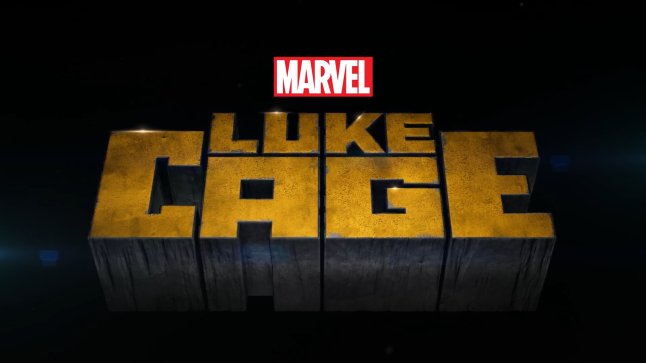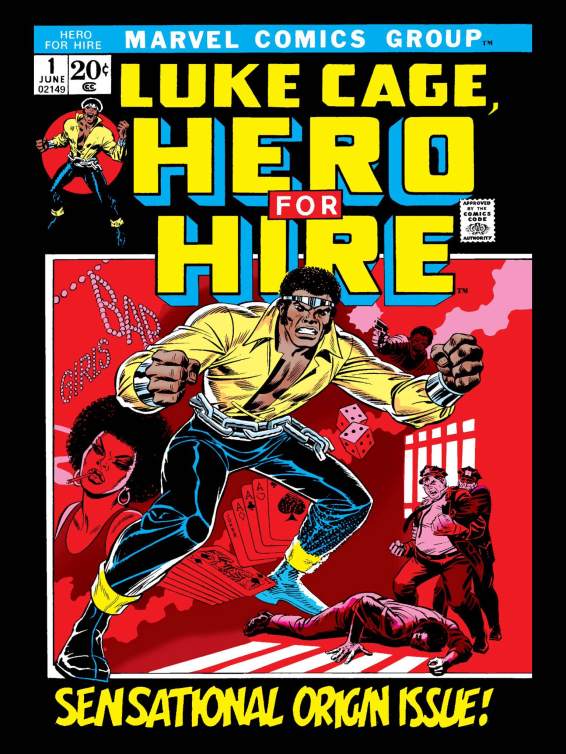
So in a few days, we will have the next installment in the Marvel/Netflix Street-Level Heroes television shows: Luke Cage. If you have watched Jessica Jones, you already know this character and why this show is exciting, if you haven’t, what are you doing? Go watch Jessica Jones. I’ll wait here and sip my coffee…

You back? Good. Okay. So let’s talk about Luke Cage. Luke Cage has a complicated and sordid publication history. He first came into comics in the 1970’s at the height of the popularity of the Blaxploitation genre, along with several other black superheroes that were created during the 70’s. As a result, his original representation is somewhat problematic, to say the least, and I don’t have the time to get into the complicated history of Blaxploitation films nor do I feel my race really qualifies me to comment on it, really, so I won’t. What I do want to talk about, though, is how Luke Cage, as a character, changed throughout the years, and why his current incarnation as played by Mike Colter is such an achievement.
So, as I said, initially, Luke Cage was created to cash in on the growing popularity of Blaxploitation films, and his original character design is indicative of that…

But as the popularity of the genre died down, and more and more people began to point out the inherent social problems with the genre, Luke Cage underwent a shift in characterization. He was paired up with Iron Fist (to be seen headlining another TV series we will be seeing from Marvel/Netflix), and was eventually rebranded as “Power Man,” and we would see several reinventions of the character from that point on, with varying degrees of financial success and several costume changes, eventually seeing him developing a relationship with Jessica Jones (which you watched right? Okay. Just checking). But amidst this complicated and shifting persona that struggled to find a place on the comic shelves that was at once successful and respectful, we see the evolution of a hero with some really unique roots, and THAT seems to the focus of the upcoming television series, so let’s talk about them.
First of all, Luke Cage is a hero from Harlem. You might be thinking “What’s the big deal?” but it IS a big deal. We don’t get heroes from disenfranchised neighborhoods very often. Heroes seem to mostly populate metropolitan epicenters (see Superman, Spider-Man, etc.), or if they do patrol poorer neighborhoods, they still come from outside those neighborhoods like some sort of guardian angel from without (i.e. Batman may help the people of the poorer areas of Gotham, but he’s a billionaire who lives in a mansion). Luke Cage is a hero of Harlem from Harlem. He is a victim of an experiment that he was coerced into, and he is turning that victimization into something empowering for him and his community. And while that’s not something that the comics often focused on, it is definitely something that the upcoming Netflix series seems to be focusing on. If the trailers are any indication, we are going to see Luke Cage acting out of a sense of responsibility to his friends and neighbors. A responsibility to use his powers to help those who, like him, are victims, and, like him, are invisible to those in power.
Now this does ignore what I feel is one of the more interesting aspects of Luke Cage’s character: That he was a hero for hire. That is to say, he would help you, but only if you could pay his rate, but I don’t actually think that’s a bad move on Marvel’s part. I like this aspect of his character in concept. We often talk about how saving the world doesn’t seem to pay very much for these heroes. As a result, they often need a billionaire to bankroll them (Bruce Wayne, Tony Stark, etc). So I have always loved the idea that Luke Cage needs to make a living somehow, as anyone in his position would, and he does so by charging for his help. But it does seem like that would sit poorly with the mainstream superhero audience, and ignoring it allows for the development of the above mentioned “savior from within,” rather than “savior from without” a systemically disenfranchised community. Now, I do hope they include a reference to this, because I think it would be interesting. One of the things that Marvel and Netflix seems to have done with this character is placed him in a similar position to Jessica Jones. Jones’ story starts post-superhero. She was Jewel, she tried the superhero gig, things didn’t work out, now she’s retired and is just trying to make a living as a P.I. Cage seems to be in a similar situation in this universe. We saw hints in JJ that maybe this isn’t the first time that he has had to reveal himself. I don’t know if we will see flashbacks of him donning a Powerman costume and asking for payment for his services, but I like to think that maybe a reference to his former attempts at heroing are not out of the question.
So in the end, I am extremely excited for this series, because I feel it comes at a particularly good time. We are seeing an upsurge in the demand and success of POC superheroes. Ms. Marvel is selling extremely well, the new Black Panther series written by Ta-Nehisi Coates is selling extremely well, Chadwick Boseman’s Black Panther in Captain America: Civil War was praised by audience and critics alike. We are seeing more diversity in comics than ever, and the fact that we get to see this really interesting character emerge out of the middle of that with a great actor and a great supporting cast is very exciting, not the least because if it is as successful as the previous ventures of Marvel and Netflix have been, it can stand as evidence that audiences are eager to see racial diversity in their superheroes in the same way that the success of Jessica Jones demonstrated the demand for gender diversity.
Edit: I forgot to mention that I will be watching Luke Cage this weekend, probably on Friday and Saturday. I’ll be live tweeting while I’m watching it over at https://twitter.com/criticalgeekery so if you guys want to watch along with me, or just follow my reaction, feel free to check that out!